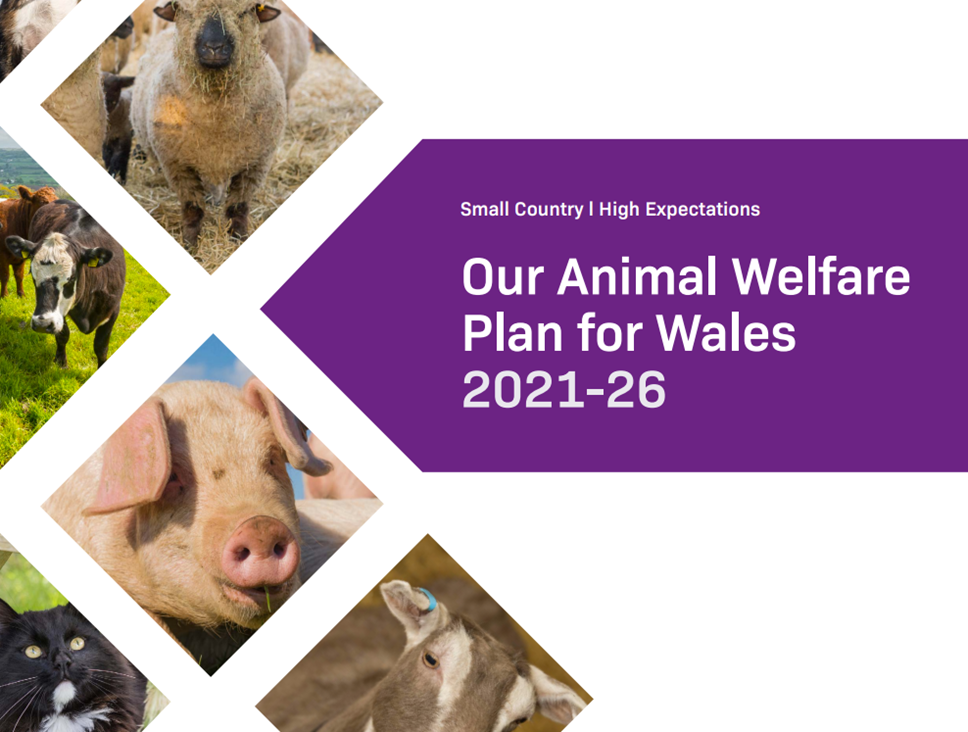
Plan to achieve good quality of life for all animals in Wales published
Cyhoeddi cynllun i sicrhau bywyd o ansawdd da i bob anifail yng Nghymru
A five-year plan which outlines steps towards achieving the ambition of ensuring a good quality of life for all animals in Wales will be published today by the Rural Affairs Minister Lesley Griffiths.
Our Animal Welfare Plan for Wales builds on what has already been achieved since the devolution of animal welfare powers in 2006.
It outlines how the Welsh Government will take forward its animal welfare commitments in its Programme for Government, and other measures to further improve animal welfare.
The plan also includes a broad range of ongoing animal welfare policy work, including statutory guidance for existing regulations, licensing of animal exhibits, welfare of animals in transport, and Codes of Practice. Finally, it describes how the Welsh Government will work collaboratively with the other UK governments to further the animal welfare agenda, for example through the forthcoming Animal Welfare (Kept Animals) Bill.
The Programme for Government commitments captured in the plan are:
- To develop a national model for the regulation of animal welfare, introducing registration for animal welfare establishments, commercial breeders for pets or for shooting, and animal exhibits;
- To Improve the qualifications for animal welfare inspectors to raise their professional status;
- To require CCTV in all slaughterhouses;
- To restrict the use of cages for farmed animals.
To mark the publication, the Minister will visit Greenmeadow Community Farm near Cwmbran.
Minister for Rural Affairs Lesley Griffiths said: “I’m very proud of what has already been achieved in Wales in animal welfare. But there is more to do. Our long-term ambition is for every animal in Wales to have a good quality of life. Today’s plan outlines steps towards achieving that ambition.
“We will work with all partners to take forward our commitments. This includes further boosting protection for pets by looking at registration of animal welfare establishments, enhancing the much-valued animal welfare inspection profession through improved qualifications, and looking at how we can minimise the use of cages for farmed animals.
“I’m also pleased to confirm that we will be requiring all slaughterhouses in Wales to have CCTV – while the vast majority already do we will ensure this is the case for all.
“Achieving a good quality of life for all animals is ambitious, but that is what we must aim for.”
Chief Veterinary Officer for Wales, Christianne Glossop said: “Well cared for animals are more often healthy and contented animals. Preventing disease and injury in the first place is always the better option. Having high animal welfare standards ensures their needs are met, whether they are companion animals or farmed livestock.
“The plan we are publishing today builds on what has already been achieved in the field of animal welfare, ensuring we continue to improve as we work towards the ambition of a good quality of life for all animals kept in Wales.”
Partnership working will be key to the success of the plan. A key component relates to the enforcement of current and future legislation and, in support of this, a Local Authority Enforcement Project, working in collaboration with Trading Standards Wales, is currently in its second year.
Strategic Lead and Trading Standards and Animal Health Manager for Monmouthshire County Council Gareth Walters has welcomed the plan. He said:
“The Local Authority Enforcement project has recently overseen the appointment of 8 new Animal Licensing Officers. They will offer crucial support required by Local Authority animal health services by providing a shared resource across Wales as a recognised point of expertise. The new officers will enable existing animal health officers to focus on wider animal health and welfare work.
“The forthcoming launch of an online information system may develop into a single point of reference for licence applications in support of the Welsh Government’s ‘National Model’ commitment, while the development of an animal licensing qualification will complement the Animal Health and Welfare professional qualification provided by the Chartered Trading Standards Institute launched earlier this year. These qualifications will provide the foundation which existing and future officers require to ensure knowledge and understanding, alongside access to specialised training where necessary”.
